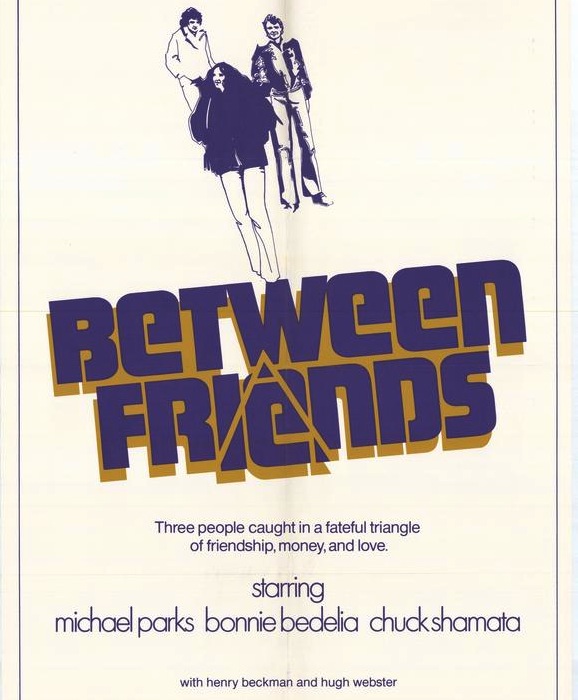Friday, July 26, 1974.
BETWEEN FRIENDS. Written by Claude Harz. Music by Matthew McCauley. Edited and directed by Don Shebib. Running time: 91 minutes. Mature entertainment with the B.C. Classifier's warning: occasional coarse language and sex.
FATE AND THE TRAGEDY that befalls friends caught up in ill-considered romance is taken up in the Canadian film on view tonight [1974] at the Varsity Festival. A bland, gutless picture, Between Friends suggests that director Don Shebib is still goin' down the road.
This new movie, his third feature, has the same contrived air as his 1971 hit, but none of its engaging honesty. Here, he has taken a formula screenplay by Claude Harz and loaded it down with a lot of intellectual pretensions, including a painful piano and violin score.
Essentially, it's another tale of losers hoping for their Big Break. Set in Toronto and Sudbury, it is the story of a nickel plant payroll robbery planned by an aging, unrepentant ex-con named Will (Henry Beckman).
Partnered with him on the job is a life-long crony named Coker (Hugh Webster). The two old buddies are not only the most interesting characters on view, but the best actors in the picture.
Their drama remains undeveloped, though. The main focus is on Toby (Michael Parks), a self-centred drifter. A Californian, he once taught a young Canadian named Chino (Chuck Shamata) how to surf.
As the story opens, Toby has reached a dead end. Having been through a marriage and some small-time crime, he decides to renew an old acquaintance and make a new start in Toronto.
He finds Chino living with Will's daughter Ellie (Bonnie Bedelia), pining for a return to the good old days on the West Coast. Inevitably, Toby becomes involved in the robbery plan.
Just as inevitably, he becomes involved with Ellie, a frustrated female who finds his soulful sensitivity a refreshing change from her hale and hearty slob of a boyfriend. The movie grinds to an embarrassing halt as the three young people agonize, and agonize, and agonize.
In Goin' Down the Road, Shebib managed to produce a moving, effective film because he was dealing with a universal theme. His hapless Maritimers were essentially good men who tried to grasp their fate by moving to the big city.
They failed because they were strangers in a strange land, dealing with forces they really didn't understand. By contrast, Between Friends is a story of arrested adolescence, a contrived tale of urbanites who never bothered to grow up.
There are some losers whose stories are tragically noble. This time out, Shebib's Friends are just plain stupid.
The above is a restored version of a Province review by Michael Walsh originally published in 1974. For additional information on this archived material, please visit my FAQ.
Afterword: A Second World War veteran, Halifax-born Henry Beckman was among the Canadians who survived the the D-Day landing on Juno Beach, an experience he was able to channel during a half-century career playing military men, brooding villains and miscellaneous authority figures. He got his start in U.S. television during its "golden age," and is remembered by early sci-fi fans for his regular appearances on the Flash Gordon series (1954-1955). In the late 1960s, he was a principal player on the two-season western comedy Here Come the Brides (1968-1970), a series set in frontier Seattle. Discovering the Northwest, Beckman afterwards made it his home, buying land in Deming, Washington, near Sumas and the Canadian border. When Canadians began making feature films in the early 1970s, he frequently crossed the border, appearing in such pictures as Shebib's Between Friends, John Howe's Why Rock the Boat? (1974), Paul Lynch's Blood & Guts (1978) and David Cronenberg's The Brood (1979). His proximity to Vancouver made it an easy drive to work when the television industry set up shop locally, and he added guest appearances on such shows as The X-Files (1993-1998), Poltergeist: The Legacy (1997), The Sentinel (1999) and Cold Squad (2001) to his resume. Henry Beckman died in 2006 at the age of 86.
See also: Director Don Shebib made another Goin' Down the Road-like movie in 1981. A fine little feature called Heartaches, it starred Margot Kidder.
